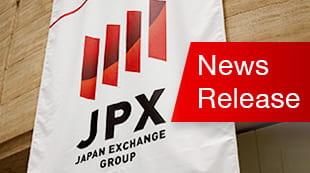Search results 9011-9020 / 10638
- sort:
- relevance
- latest

1 Development of Listing Rules for the Implementation of the Corporate Governance Code February 24, 2015 Tokyo Stock Exchange, Inc. I. Purpose The Corporate Governance Code (“Code”) has been drafted and is scheduled to be implemented in June 2015 in line with the government's growth strategy, "Japan Revitalization Strategy (Revised 2014)" formulated in June 2014. The growth strategy also calls for TSE’s listing rules to require listed companies to explain the reason for non-compliance with the Code. TSE will make the necessary revisions to its rules and regulations to achieve this comply-or-explain regime. In addition to these revisions, information disclosure regarding independence of independent directors/auditors will be revised to contribute to the smooth appointment of independent directors. II. Outline Items Contents Remarks 1. Development of Rules for the Implementation of the Code (1) Explanation of reason for non-compliance with the Code - Companies listed ...

- 1– DISCLAIMER: This translat ion may be used for reference purposes only. This English version is not an official transla tion of the origina l Japanese document . In cases where any di fferences occur between the English version and the or iginal Japanese version, the Japanese version sha ll prevai l. This transla tion is subject to change withou t notice. Tokyo Stock Exchange, Inc. and/or Japan Exchange Regulation shal l individually or joint ly accept no responsibili ty or liabi lity for damage or loss cause d by any error, inaccuracy, misunderstanding, or changes with rega rd to this t ransla tion. Listing Provisions to Support Recovery of Corporations Affected by the 2016 Kumamoto Earthquake May 16, 2016 Tokyo Stock Exchange, Inc. I. Purpose The 2016 Kumamoto Earthquake has caused extensive damage to communities and properties in the Kyushu region. Damage to the region's infrastructure and ...

TSE Measures for Corporations Affected by the 2016 Kumamoto Earthquake Flexible Treatment related to Delisting Liabilities in Excess of Assets: Delist if unable to come out of liabilities in excess of assets within 1 year ⇒Extend window to 2 years for liabilities in excess of assets resulting from extraordinary losses due to the earthquake Business Performance: Delist if both operating profit and cash flow are negative for 5 years ⇒Exclude negative operating cash flow resulting from extraordinary losses due to the earthquake Delay in Submission of Securities Report: Delist if securities report is not submitted by the statutory deadline ⇒Extended deadline with designation as specified disaster Flexible Treatment related to Listing Examinations Audit Opinion: Require unqualified opinion for the most recent business year ⇒Allow for qualified opinion due to the earthquake Going Concern: Examine whether the applicant is able to generate operating income on a ...

Increasing Flexibility of Earnings Reports and Quarterly Earnings Reports October 28, 2016 Tokyo Stock Exchange, Inc. I. Purpose In its "Japan Revitalization Strategy-Revised in 2015", the government asked for an extensive consideration of formats for information disclosure to encourage constructive dialogue between companies and investors for sustainable corporate growth. In response to this request, on April 18, 2016, the Financial System Council's Working Group on Corporate Disclosure proposed to increase flexibility with respect to corporate information disclosure based on the three regulatory frameworks that require disclosure: the Companies Act, the Financial Instruments and Exchange Act, and the listing rules. The proposal is aimed at coordinating the overall framework to enable disclosure to be made in a more efficient, effective, and timely manner, in a form that is easier to understand. Tokyo Stock Exchange will increase flexibility for information disclosure by removing the requirement to use its formats for ...

- 1 - Summary of Comments Submitted in the Public Consultation Procedure Regarding "Increasing Flexibility of Earnings Reports and Quarterly Earnings Reports" (Limited to Comments made in English) Tokyo Stock Exchange, Inc. (hereinafter "TSE") released the outline of "Increasing Flexibility of Earnings Reports and Quarterly Earnings Reports" on October 28, 2016 and sought public comment until November 27, 2016. The summary of the comments gathered and TSE’s responses to the comments are as follows. Please note that this document contains content pertaining to comments submitted in English. Comments made in Japanese and their corresponding responses have been omitted. No. Summary of Comments TSE Response 1. Increasing flexibility of earnings reports 1Pursuant to the proposal, the Tokyo Stock Exchange (TSE) will increase flexibility for company disclosure by removing the requirement to use its formats for the Earnings Reports. The new proposal also reduces information covered by the current eXtensible Business ...

1 DISCLAIMER: This translation may be used for reference purposes only. This English version is not an official translation of the original Japanese document. In cases where any differences occur between the English version and the original Japanese version, the Japanese version shall prevail. This translation is subject to change without notice. Tokyo Stock Exchange. Inc. and/or Japan Exchange Regulation shall individually or jointly accept no responsibility o r liability for damage or loss caused by any error, inaccuracy, misunderstanding, or changes with regard to this translation. Review of Viewpoints and Operations of Listing Examination for Relisting after MBO December 2, 2016 Tokyo Stock Exchange, Inc. Japan Exchange Regulation 1. Introduction When a company that was delisted due to a management buyout (hereinafter "MBO") applies for a relisting of stocks, we conduct additional examinations apart from the regular listing examination. We have hereby decided to review viewpoints and operations ...

Revision of Japan’s Corporate Governance Code based on the proposal of the Council March 30, 2018 Tokyo Stock Exchange, Inc. I. Purpose The Council of Experts Concerning the Follow-up of Japan’s Stewardship Code and Japan’s Corporate Governance Code (the“Council”) handled jointly by the Financial Services Agency and Tokyo Stock Exchange (“TSE”) has made proposals to revise the Corporate Governance Code in order to deepen and make more substantive Japan’s corporate governance reform through engagement between investors and companies. In accordance with these proposals, TSE will make the necessary revisions to the Securities Listing Regulations. II. Outline Item Contents Remarks Revision of the Code TSE shall revise Japan’s Corporate Governance Code as attached. Listed companies shall submit their corporate governance reports immediately after the preparation of the revised version thereof, but not later than the end of December 2018. III. Implementation Date (...

Japan’s Corporate Governance Code Seeking Sustainable Corporate Growth and Increased Corporate Value over the Mid- to Long-Term June 1, 2018 Tokyo Stock Exchange, Inc. Provisional translation - 1 - Japan’s Corporate Governance Code In this Corporate Governance Code,“corporate governance”means a structure for transparent, fair, timely and decisive decision-making by companies, with due attention to the needs and perspectives of shareholders and also customers, employees and local communities. This Corporate Governance Code establishes fundamental principles for effective corporate governance at listed companies in Japan. It is expected that the Code’s appropriate implementation will contribute to the development and success of companies, investors and the Japanese economy as a whole through individual companies’self-motivated actions so as to achieve sustainable growth and increase corporate value over the mid- to long-term. - 2 - General Principles Securing the Rights and Equal Treatment of Shareholders 1. Companies should take ...

Japan’s Corporate Governance Code Seeking Sustainable Corporate Growth and Increased Corporate Value over the Mid- to Long-Term June 1, 2018 Tokyo Stock Exchange, Inc. Provisional translation The revised Code with track changes from the previous version of the Code - 1 - Japan’s Corporate Governance Code In this Corporate Governance Code,“corporate governance”means a structure for transparent, fair, timely and decisive decision-making by companies, with due attention to the needs and perspectives of shareholders and also customers, employees and local communities. This Corporate Governance Code establishes fundamental principles for effective corporate governance at listed companies in Japan. It is expected that the Code’s appropriate implementation will contribute to the development and success of companies, investors and the Japanese economy as a whole through individual companies’self-motivated actions so as to achieve sustainable growth and increase corporate value over the mid- to long-term. - 2 - General ...

Summary of Comments in the Public Consultation Procedure Regarding“Revision of Japan’s Corporate Governance Code based on the proposal of the Council” Tokyo Stock Exchange, Inc. (hereinafter“TSE”) released an outline of the revision of the Corporate Governance Code taking into consideration the proposal from the Follow-Up Council on March 30, 2018 and accepted a wide range of opinions in the period between March 30, 2018 and April 29, 2018. As a result, 69 comments were received. A summary of the main comments received regarding this matter and the stance of TSEtowards these comments is as follows. Table of Contents 1. Revision of the Corporate Governance Code Overall...............................................................................................1 2. Management Decisions in Response to Changes in the Business Environment and thePolicy of Investment Strategy and Financial Management .................................................................................................................................8 3. CEO Appointment/Dismissal and Responsibilities of the Board...............................................................15 (1) CEO Appointment/Dismissaland Development..............................................................................................15 (2) Determination of ...














